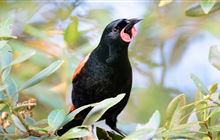New Zealand congratulated on Predator Free campaign
Archived content: This media release was accurate on the date of publication.
Introduction
Conservation Minister Maggie Barry says the Predator Free 2050 project is making good progress on the first anniversary of its announcement at Zealandia in Wellington.Date: 25 July 2017 Source: Office of the Minister of Conservation
“Today marks one year since the Government committed to our ambitious, world-leading plan to eradicate possums, rats and stoats from New Zealand by 2050,” Ms Barry says.
The Minister returned to Zealandia today to show British Foreign Secretary Boris Johnson what New Zealand used to look and sound like before the arrival of introduced vermin.
“The Foreign Secretary congratulated New Zealand on our ‘campaign of slaughter’ and said many people did not grasp the threat to our birds, insects and reptiles posed by introduced mammals.
“Predator Free 2050 is the most important conservation project in the history of our country – one which will secure our native species from the threat of extinction and safeguard them for future generations.
“Over the last year we’ve seen tremendous enthusiasm and support for the goal. More and more communities are signing up to work with DOC on predator control and we’ve built a national movement dedicated to achieving our objective – one which is receiving international interest.”
Predator Free 2050 Ltd, which will direct $28 million initial funding into large-scale landscape predator control projects and scientific research, is up and running with an announcement on the first project it will support expected by the end of the year. It has a draft science strategy to develop the tools and technology needed for the task ahead.
DOC has set up a team of nine Predator Free Community Rangers, backed with a contestable fund of $300,000. Their job is to use their expertise and skills to help communities scale up efforts, commit people to the cause and coordinate plans.
“The community rangers can help plan trapping strategies, set up trap libraries and ensure we’re getting the most out of everyone’s time and effort,” Ms Barry says.
A Predator Free 2050 online community toolkit will be launched in the coming weeks.
In addition, three multi-year research projects have received $1.24m support from the first round of the DOC-managed Tools to Market fund, which helps develop promising predator control science into operational tools.
DOC has also started work on plans to eradicate pigs and other invasive species from the Auckland Islands in the Subantarctic.
“This is just the start of a long road, but if we work together we can achieve something once thought impossible. The Government backs New Zealanders to do it.”
Four interim goals have been set for the project by 2025:
- An additional 1 million hectares of land where pests have been supressed or removed through Predator Free New Zealand partnerships
- Development of a scientific breakthrough capable of removing at least one small mammalian predator from New Zealand entirely
- Demonstrate areas of more than 20,000 hectares can be predator free without the use of fences
- Complete removal of all introduced predators from offshore island nature reserves
Contact
For media enquiries contact:
Email: media@doc.govt.nz

